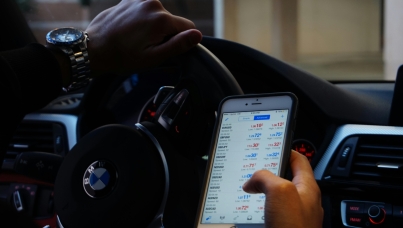Where Can I Put My Stuff?
The Age-Old Challenge Stronger Than Ever In The Digital Age!
Iomega commissions MORI Survey to examine the place and role of digital data in Europeans' lives in Great Britain, France and Germany
GENEVA, Switzerland, June 21, 2001 - Iomega International S.A., the European headquarters of Iomega Corporation (NYSE: IOM), a global leader in data management solutions, today released the results of a MORI survey it commissioned to examine the digital behaviour of Europeans at home and in the workplace. The survey, conducted in March and April 2001, queried working business and home users of laptop and desktop computers in Germany, France and Great Britain. The results? A fascinating glimpse at the sociological whos, whats, whens, wheres and whys that explain how Europeans are dealing with information today.
For Europeans, more is better
One of the key findings of the report was that these Europeans are comfortable with the number of digital devices they currently own or use and at least half expect this number to increase in the future. In fact, well over 50% (and in Great Britain over 70%) of users expect a divergence of devices to get their digital tasks done. Breaking down the survey into age groups, over 75% of users between age 15 and 24 shared this expectation.
However, when it comes to storing the data their devices produce, it's a different story. Users want a single device to hold their data, whether it is CDs, videos or work files. In fact, the report shows that not only do working European computer users want to squirrel away all of their digital data, they want to take it with them wherever they go. The most startling result? Nearly 75% of Britons, 59% of the French and over one-third of the Germans indicate that they would like to be able to store all their personal data on one portable device.
This result was true for people in the workplace, too. Many of those responding, in Great Britain (34%), France (23%) and Germany (17%), would love to take their employer's entire computer network with them when working remotely. Laptop users were even clearer: one-third of Germans and nearly one-half of the French and the British indicated that doubling the capacity of their laptops on the road would really help them.
"Contrary to industry perceptions, people seem to be very comfortable with a divergence of digital devices in their lives - as long as they have a safe, single space to store their data. In the work arena, this report confirms that mobile professionals no longer want to keep their digital lives to a minimum on the road," said Peter Wharton, Marketing Director, Europe at Iomega International. "At once, they want full access to their company's network as well as access to their personal email, music collection and digital photos."
Get a (digital) life!
No question about it: Europeans would rather lose personal photos and emails from friends and family than their digital work files. The report shows that nearly 50% of these European workers would feel upset about losing work documents compared to fewer than 20% who would miss their personal emails or favourite CD. In France, fully 65% of laptop and desktop working computer users would be emotionally distraught by the loss of their 'soft' work documents, a culturally significant confirmation of the fact that, for the French today, digital data is the stuff mainly of work, not play.
Overall, the survey confirmed few emotional ties between users and their personal data, showing that today's 'digital lifestyle' is still centred on work. Going a step further, however, Iomega asked these Europeans which digital devices they used in their lives: less than 25% of those polled in any country used DVD players, digital cameras and MP3 players, while only between a fifth and a third of users had games consoles. CD players were the only devices used by a majority in all countries. The one bright spot? The country that indicated the highest uptake of digital devices, Britain, also voiced some emotional attachment to their personal files. (A quarter of Britons would feel upset about losing their digital photos, for instance, while only 15% of the French and very few of the Germans felt the same).
"In measuring the emotional value of data in peoples' lives we were surprised to find that people are worried about work and financial data more than anything else," commented Peter Wharton, Marketing Director, Europe at Iomega International. "Europeans need to balance their work and personal lives more effectively, and Iomega has always strived to encourage people to broaden their digital horizons. This is one of the reasons we sponsor activities like the Biarritz Surf Festival: it's all about demonstrating the vitality of the digital lifestyle in all areas of life."
The more you have, the more you lose
Finally, the survey found that, whether at home or at work, the more data and devices you have, the more you are likely to lose it! The British, who indicated by far the highest uptake of digital devices, were, naturally, the most likely to have lost valuable data (43%). This compares to Germany's response of just 13% of users admitting they had lost valuable data. However, a deeper analysis of the data shows that young Germans, who, according to the survey, have been far more enthusiastic about adopting digital devices, also experienced more loss than older age groups.
What kinds of data were lost? Of those that had lost data, nearly three quarters in France and Great Britain, and just over one half in Germany have lost information relating to work, confirming the findings on these Europeans' emotional attachment to such data. When asked how they lost their data, two reasons came through loud and clear: accidental deletion followed by hard disk drive failure.
Wharton commented, "A digital lifestyle is not viable without protection and security. With more and more people working from home or travelling for business, and increasing numbers of users sharing their personal photos and music, the need for a reliable and safe place to store data is crucial. While Iomega cannot control the quality of digital devices and computer equipment, it can certainly ensure that people can store and share their data with peace of mind."
Ulrike Tegtmeier, Managing Director, Iomega International, summed up: "Whether at home, in the work place or somewhere between the two, storage is becoming a crucial factor in determining just how comfortable our digital lifestyles can be. Iomega's mission has always been to provide the solutions that ensure that people can actually use, save and share their data. The latest in our product family, the Peerless drive, goes a long way to answering the demand for what this survey shows users expect: a divergence of devices, but a sufficiently large, safe and easy place to care for - and carry - one's digital life."
Technical details
This research was conducted in Great Britain, France and Germany conducted on behalf of Bite Communications/Iomega. A nationally representative sample of working adults, aged 15 and over, were interviewed face-to-face in each of the three countries. All use a PC or laptop either at home or at work. Sample sizes were as follows:
- Great Britain, 575 working PC or laptop users
- France, 446 working PC or laptop users
- Germany, 385 working PC or laptop users
Data have been weighted to reflect the national population profile


